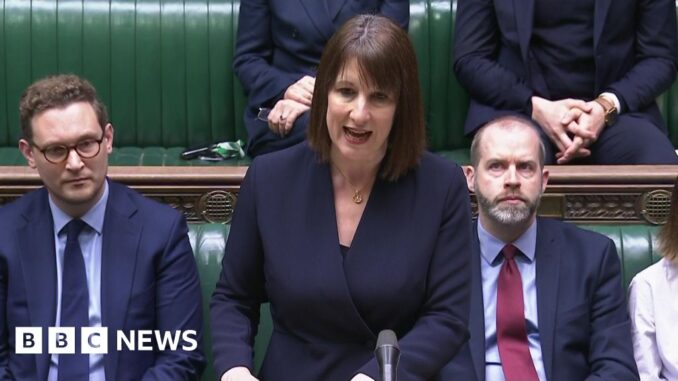
Chancellor Rachel Reeves has pledged to go “further and faster” to improve economic growth after market turbulence saw the cost of servicing UK debt rise.
The last few days have seen pressures on the public finances increase, after government borrowing costs hit their highest level for several years.
Conservative shadow chancellor Mel Stride called it “a crisis made in Downing Street,” saying business tax rises in October’s Budget had dented the UK’s economic prospects.
Reeves said she was “under no illusion” about the scale of the challenge on the economy.
It is understood she will now bring forward announcements from Labour’s promised industrial strategy within the next two weeks.
The chancellor was addressing the Commons following her return to the UK from a trip to China to drum up investment.
During the debate, she accused Conservative critics of ignoring “global volatility” behind rising borrowing costs in other countries such as the US, Germany and France.
“The economic headwinds that we face are a reminder that we should, indeed we must, go further and faster in our plan to kick-start economic growth that plunged under the last government,” she told MPs.
Reeves promised to set out new economic policies after next week’s meeting of the World Economic Forum in Davos.
The BBC has been told the industrial strategy, promised in Labour’s manifesto, is now being “fast tracked” to help bolster growth.
Sector-specific announcements, like this week’s strategy for boosting artificial intelligence, will be rolled out in the coming weeks.
On Tuesday, the yield on 30-year government bonds – the interest rate at which the government pays back investors – stood at 5.42% – close to the highest since 1998.
The yield on debt due for repayment in 10 years was 4.87% – close to the highest since 2008.
If sustained, higher UK borrowing costs may raise annual debt interest by £10bn by 2029-30, wiping out the Chancellor’s £10bn headroom against her self-imposed fiscal rules.
Speaking in the Commons, Stride accused the government of having “talked down the economy” and “crippled businesses” with rises in the Budget to employers’ National Insurance contributions.
“Growth has been killed stone dead, inflation is rising impacting millions, interest rates are staying higher for longer, and business confidence has fallen through the floor,” he added.
“This is a crisis made in Downing Street.”
On Monday, Sir Keir Starmer said he had “full confidence” in Reeves and the government was committed to its fiscal rules.
But Conservative leader Kemi Badenoch accused him of refusing to back her after he declined at a press conference to answer specifically whether she would be in post at the next election.
Downing Street later confirmed the prime minister intended to keep Reeves as his Chancellor for the duration of this Parliament.


Be the first to comment